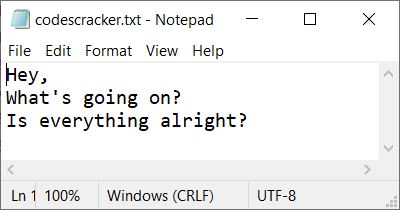- PHP Basics
- Learn PHP
- PHP Comments
- PHP Data Types
- PHP Variables
- PHP Operators
- PHP echo
- PHP print
- PHP echo vs. print
- PHP if else
- PHP switch
- PHP for Loop
- PHP while Loop
- PHP do...while Loop
- PHP foreach Loop
- PHP break and continue
- PHP exit()
- PHP exit() vs. break
- PHP isset()
- PHP Arrays
- PHP print_r()
- PHP unset()
- PHP Strings
- PHP Functions
- PHP File Handling
- PHP File Handling
- PHP Open File
- PHP Create a File
- PHP Write to File
- PHP Read File
- PHP feof()
- PHP fgetc()
- PHP fgets()
- PHP Close File
- PHP Delete File
- PHP Append to File
- PHP Copy File
- PHP file_get_contents()
- PHP file_put_contents()
- PHP file_exists()
- PHP filesize()
- PHP Rename File
- PHP fseek()
- PHP ftell()
- PHP rewind()
- PHP disk_free_space()
- PHP disk_total_space()
- PHP Create Directory
- PHP Remove Directory
- PHP Get Files/Directories
- PHP Get filename
- PHP Get Path
- PHP filemtime()
- PHP file()
- PHP include()
- PHP require()
- PHP include() vs. require()
- PHP mysqli Tutorial
- PHP mysqli Tutorial
- PHP and MySQL Setup
- PHP mysqli: Create Database
- PHP mysqli: Create Table
- PHP mysqli: Insert Record
- PHP mysqli: Update Record
- PHP mysqli: Fetch Record
- PHP mysqli: Delete Record
- PHP mysqli: SignUp Page
- PHP mysqli: LogIn Page
- PHP mysqli: Store User Data
- PHP mysqli Functions
- PHP mysqli_connect()
- PHP mysqli_close()
- PHP mysqli_connect_errno()
- PHP mysqli_connect_error()
- PHP mysqli_query()
- PHP mysqli_fetch_row()
- PHP mysqli_fetch_assoc()
- PHP mysqli_fetch_array()
- PHP mysqli_free_result()
- PHP mysqli_error()
- PHP mysqli_prepare()
- PHP mysqli_stmt_bind_param()
- PHP mysqli_stmt_execute()
- PHP mysqli_stmt_fetch()
- PHP mysqli_stmt_store_result()
- PHP mysqli_stmt_num_rows()
- PHP mysqli_stmt_bind_result()
- PHP mysqli_stmt_get_result()
- PHP mysqli_result class
- PHP mysqli_report()
- PHP error_reporting()
- PHP mysqli_real_escape_string()
- PHP htmlspecialchars()
- PHP Misc Topics
- PHP Object Oriented
- PHP new Keyword
- PHP header()
- PHP getallheaders()
- PHP Cookies
- PHP Sessions
- PHP Date and Time
- PHP GET vs. POST
- PHP File Upload
- PHP Image Processing
PHP fseek(): Move File Pointer
The PHP fseek() function is used when we need to move the file pointer to a particular position in the file. For example:
<?php
$file = "codescracker.txt";
$fp = fopen($file, "r");
$line = fgets($fp);
echo $line;
echo "<br>";
fseek($fp, 0); // moves file pointer to beginning
$line = fgets($fp);
echo $line;
fclose($fp);
?>
The output of the above PHP example on the fseek() function is:

Note: Using the fseek() function, we can move the file pointer to the required position, using the number of bytes from the start. For example, use 0 to put the file pointer at the beginning of the file and 12 to put the file pointer 12 characters forward from the beginning of the file. To put a file pointer at the end of a file, you can use filesize(file).
Please keep in mind that the filesize() function returns the size of a file.
PHP fseek() Syntax
The syntax of the fseek() function in PHP is:
fseek(filePointer, numberOfBytes, whence)
The first two parameters (filePointer and numberOfBytes) are required, whereas the last parameter is not (optional).
Note: The filePointer parameter specifies the pointer to the file.
Note: The numberOfBytes parameter specifies the number of bytes to move the file pointer to from the beginning of the file.
Note: The whence parameter is used when we need to force the fseek(), not to seek the file pointer from the beginning, but rather to seek from either the current position or from the end of the file. Here is the list of values used to define the whence parameter:
- SEEK_SET: This is the default value that is used to utilize fseek() as usual.
- SEEK_CUR: Used when we need to move the file pointer to a given number of bytes from its current position, not from the beginning of the file.
- SEEK_END: Used when we need to move the file pointer to a given number of bytes from the end of the file instead of the beginning. The value of numberOfBytes in this case must be a negative value.
PHP Move File Pointer from its Current Position
Before creating an example, let's take a snapshot of the file, say, codescracker.txt, that is going to be used:

Now here is an example of seeking a file pointer from its current position instead of beginning.
<?php
$file = "codescracker.txt";
$fp = fopen($file, "r");
if($fp)
{
$line = fgets($fp);
echo $line;
echo "<br>";
fseek($fp, 7, SEEK_CUR);
$line = fgets($fp);
echo $line;
fclose($fp);
}
else
echo "<p>Unable to open the file</p>";
?>
The output of the above PHP example should be:

Look at the output; all seven characters, including a space, were skipped.
PHP Move File Pointer from the End of File
<?php
$file = "codescracker.txt";
$fp = fopen($file, "r");
if($fp)
{
$line = fgets($fp);
echo $line;
echo "<br>";
fseek($fp, -8, SEEK_END);
$line = fgets($fp);
echo $line;
fclose($fp);
}
else
echo "<p>Unable to open the file</p>";
?>
The output of the above PHP example should be:

« Previous Tutorial Next Tutorial »